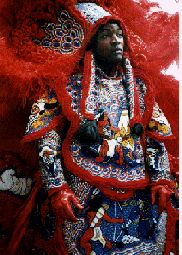
DATELINE: Tulsa, Oklahoma - July 1, 2007: Well, all those Mardi Gras parade floats filled with drunk black men dressed up as Indians, decrying their, "Indian Blood," wasn't a case of insanity after all. In my search to find a place to buy a small farm and create a livelihood in rural America has brought me here to Oklahoma, a place rich in Native American … and black history.
Oklahoma was part of the Indian Territories and has a rich history that is intertwined with African American history and African-Native American history.
There are physical monuments (towns, buildings and structures) built by blacks that remain today. The Buffalo soldiers also had a very significant role in settling this area. The area near Ft. Sill near Lawton, Oklahoma, was where the first black Civil War Union Soldiers distinguished themselves in what has been known as, The Gettysburg of The West.
More significant is the history if black Seminal Indians who came up from Florida with the aboriginal Florida Seminoles. There were actually three branches of Native Americans relevant to African American History:
1.) White acculturated Indians (the Creek, Cherokee, Choctaw, Chickasaw, and others. For example, the Creek changed their names to Scottish surnames, took blacks as slaves, and changed their names too..)
http://www.african-nativeamerican.com/resour.htm
2.) Aboriginals like the Seminoles who were never concurred and who never adapted to "the white mans ways"
3.) African-Indians and Seminole Freemen. Many Africans who ran away from white slavery and escaped into Spanish controlled Florida, were adopted by Seminoles. Blacks who were their off-spring were never slaves and proved unsuitable for Andrew Jackson’s campaign to force them to become slaves. http://www.african-nativeamerican.com/
So it is here that I find myself now, seeking to start my next leg in re-creating my life, and discovering that Oklahoma is a far more fertile ground than California for anyone who has developed transferable skills. There are plenty of opportunities here for people who want to start their own small business. There are a lot of good people here. The land is green for those who want to farm and prepare themselves for the "Global Recession" that is certainly heading our way. (And we KNOW who is historically hurt worst by "recessions." I wish I'd left California earlier.)
African and Seminole towns in the Indian Territories
http://www.african-nativeamerican.com/6-towns.htm
No comments:
Post a Comment